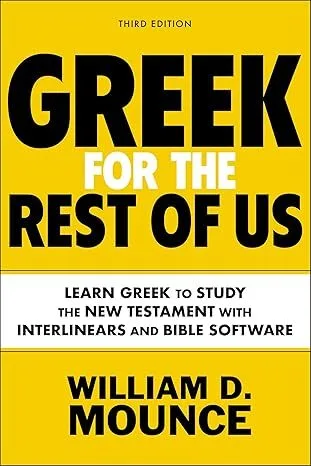Pronunciation Guide: ay POCE (where ‘ay’ rhymes with ‘day’ and ‘poce’ rhymes with ‘gross’)
Basic Definition

Key Information
εἴ πως

Strong’s Entry
g1513
Strong’s G1513: εἴ πως (ei pōs) is a conditional particle combination expressing hopeful possibility. It conveys the sentiment “if perhaps” or “if somehow” and indicates an earnest desire for a specific outcome while acknowledging uncertainty. This construction appears in contexts where someone expresses a genuine hope or striving toward a goal that remains in God’s sovereign hands.
Etymology and Morphology
- Part of Speech: Conditional particle combination
- Components: εἴ (ei, “if”) + πως (pōs, “somehow, by any means”)
- Language Origin: Ancient Greek
- Literary Usage: Primarily appears in epistolary and narrative contexts
- Syntactical Role: Usually introduces dependent clauses expressing purpose or hoped-for result
εἴ πως Morphology:
- εἴ (conditional particle) – “if”
- πως (adverbial particle) – “somehow, by any means”
- Together they function as a unified grammatical unit expressing contingent hope
Origin & History
The combination εἴ πως has deep roots in classical Greek literature, where it was employed to express hopeful uncertainty. In works such as Thucydides’ “History of the Peloponnesian War,” the construction appears in military contexts where commanders hope for favorable outcomes while acknowledging the uncertainties of battle. The phrase maintains this sense of hopeful striving in the face of uncertainty throughout Greek literary development.
In the Septuagint, εἴ πως appears in passages where biblical figures earnestly seek divine favor or intervention. For instance, in 2 Maccabees 11:19, the construction is used when describing attempts to secure peace, highlighting the element of hopeful uncertainty that characterizes diplomatic negotiations. By the time of the New Testament, this grammatical construction had developed a particular theological significance, often appearing in contexts where human agency meets divine sovereignty.
Expanded Definitions & Translation Options
- A conditional expression indicating earnest hope with acknowledgment of uncertainty
- A particle combination suggesting purposeful striving toward a possibility
- A grammatical construction expressing intense desire with recognition of limitations
- A phrase indicating determined effort toward a goal whose outcome remains in God’s hands
εἴ πως Translation Options:
- “If perhaps” – Captures the basic conditional uncertainty while maintaining simplicity
- “If somehow” – Emphasizes the element of method or means by which something might be accomplished
- “If by any means” – Underscores the determination and willingness to try every possible approach
- “In the hope that” – Foregrounds the hopeful aspect while somewhat softening the explicit conditionality
- “If it might be possible that” – Expands the phrase to emphasize the element of possibility
Biblical Usage
In the New Testament, εἴ πως appears at pivotal moments where human striving meets divine possibility. Its first appearance in Acts 27:12 occurs during Paul’s dangerous voyage to Rome, where the ship’s crew hopes to reach a safer harbor: “Since the harbor was unsuitable to winter in, the majority decided to sail on, if perhaps [εἴ πως] they could reach Phoenix and winter there.” This usage perfectly captures the essence of the term: a genuine hope tempered by realistic acknowledgment of limitations.
Perhaps most theologically significant is Paul’s usage in Romans 11:14, where he explains his ministry to the Gentiles: “In the hope that I may somehow arouse my own people to envy and save some of them.” Here, εἴ πως reveals Paul’s passionate desire for Jewish salvation while recognizing this outcome ultimately rests in God’s sovereign hands. Throughout the New Testament, this construction appears in contexts where believers earnestly strive toward godly outcomes while humbly acknowledging divine sovereignty.
- “Since the harbor was unsuitable to winter in, the majority decided to sail on, if perhaps [εἴ πως] they could reach Phoenix and winter there.” Acts 27:12
- “I do all this for the sake of the gospel, if somehow [εἴ πως] I may share in its blessings.” 1 Corinthians 9:23
- “I want to know the Messiah and the power of his resurrection and the fellowship of sharing in his sufferings, becoming like him in his death, and if somehow [εἴ πως] to attain to the resurrection from the dead.” Philippians 3:10-11
- “In the hope that I may somehow arouse my own people to envy and if perhaps [εἴ πως] save some of them.” Romans 11:14
Cultural Insights
In the ancient Mediterranean world, particularly within Hellenistic Jewish communities, expressions of contingent hope like εἴ πως reflected a delicate balance between human responsibility and divine sovereignty. This grammatical construction aligned perfectly with the Jewish theological concept of “hishtadlut” (השתדלות) – the principle that humans must make genuine, wholehearted efforts while simultaneously recognizing that ultimate outcomes remain in יהוה’s hands.
The concept resonated deeply in first-century Mediterranean culture, where maritime travel (as seen in Acts 27:12) involved significant risks beyond human control. Sailors would make every possible preparation and calculation, yet ultimately recognized their dependence on favorable winds and weather – elements entirely beyond their influence. The phrase εἴ πως thus captured this cultural reality: the tension between determined human effort and humble acknowledgment of limitations. For Paul’s readers, this construction would have immediately evoked this familiar cultural dynamic of earnest striving paired with humble dependence.
Theological Significance
The consistent New Testament usage of εἴ πως reveals a profound theological principle: the beautiful harmony between human responsibility and divine sovereignty in God’s redemptive plan. When Paul employs this construction regarding his ministry (Romans 11:14) or his own spiritual journey (Philippians 3:11), he demonstrates that passionate striving and humble dependence are not contradictory but complementary aspects of faithful discipleship.
This grammatical construction provides a powerful corrective to both passive fatalism and self-reliant humanism. The faithful believer neither sits idly waiting for God to act nor presumes that outcomes depend entirely on human effort. Instead, εἴ πως encapsulates the biblical balance: wholehearted striving with open-handed surrender. It reminds us that God has designed His kingdom to advance through our passionate participation, yet the ultimate fruition of our efforts remains His sovereign gift. This paradoxical truth – that we must work as if everything depends on us while praying as if everything depends on God – finds perfect expression in this modest yet profound grammatical construction.
Personal Application
When we understand the deeper meaning of εἴ πως, it transforms our approach to spiritual goals and aspirations. Rather than being paralyzed by uncertainty or puffed up with presumption, we can embrace the biblical balance of determined effort and humble dependence. Whether seeking to witness to an unbelieving friend, overcome a persistent sin, or pursue a God-honoring goal, the spirit of εἴ πως teaches us to act with both passion and patience.
Consider approaching your next spiritual challenge with this mindset: “I will pursue this goal with all my strength, wisdom, and resources, if perhaps God might bring it to fruition according to His perfect will.” This perspective frees us from both the anxiety of controlling outcomes and the apathy of passive waiting. Like Paul on his journey to Rome or in his ministry to the Gentiles, we can embrace the holy tension of working diligently while resting completely in God’s sovereign plan. When we live in the spirit of εἴ πως, we discover the paradoxical truth that our greatest striving happens alongside our deepest surrender.
Related Words
- μήπως (mēpōs) – “lest somehow, lest perhaps” – While εἴ πως expresses hopeful possibility, μήπως indicates anxious concern about a negative possibility. Both involve uncertainty, but with opposite emotional valences. See G3381
- εἴπερ (eiper) – “if indeed, since” – A strengthened form of εἴ that expresses a condition with greater certainty than εἴ πως. Where εἴ πως acknowledges uncertainty, εἴπερ leans toward confident expectation. See G1512
- εἴγε (eige) – “if indeed” – Similar to εἴπερ but with a slight emphasis on the conditional nature of the statement. Less tentative than εἴ πως but still maintains some element of contingency. See G1489
- ἐάν πως (ean pōs) – “if somehow, if perhaps” – A close synonym to εἴ πως but with the conditional particle ἐάν instead of εἴ, sometimes suggesting a slightly more indefinite condition. See G1437 + G4458
- ὅπως (hopōs) – “so that, in order that” – A related purpose particle that expresses aim or goal but lacks the explicit conditional element found in εἴ πως. See G3704
Did you Know?
- Did you know that εἴ πως appears at critical junctures in Paul’s ministry and writings, often revealing his most profound theological tensions? In Philippians 3:11, he uses this construction regarding his own resurrection hope, showcasing that even the great apostle held his spiritual aspirations with both passionate pursuit and humble submission to God’s sovereign will.
- Did you know that ancient Jewish prayer traditions often embody the spirit of εἴ πως without using the exact Greek terminology? Many traditional Jewish prayers include the phrase “im yirtzeh Hashem” (אִם יִרְצֶה הַשֵּׁם) meaning “if God wills,” reflecting the same theological balance between human petition and divine sovereignty that characterizes the New Testament usage of εἴ πως.
- Did you know that modern Greek still uses a similar construction (αν πως) in everyday speech when expressing hopeful uncertainty? When a Greek speaker today says “αν πως καταφέρω” (an pos katafero), they are expressing “if somehow I manage to” – carrying forward the ancient nuance of determined effort paired with acknowledgment of limitations that we find in the biblical εἴ πως.
Remember This
The humble yet hopeful εἴ πως teaches us that the path of faith involves passionate striving hand-in-hand with complete surrender – not as contradictory forces but as complementary expressions of genuine trust in a sovereign God who invites our wholehearted participation in His perfect plan.
Note: While this entry strives for accuracy, readers engaged in critical research should verify citations and keyword occurrences in their Bible translation of choice. For Biblical citations, the F.O.G Bible project recommends Logos Bible software.
Strong's g1513




